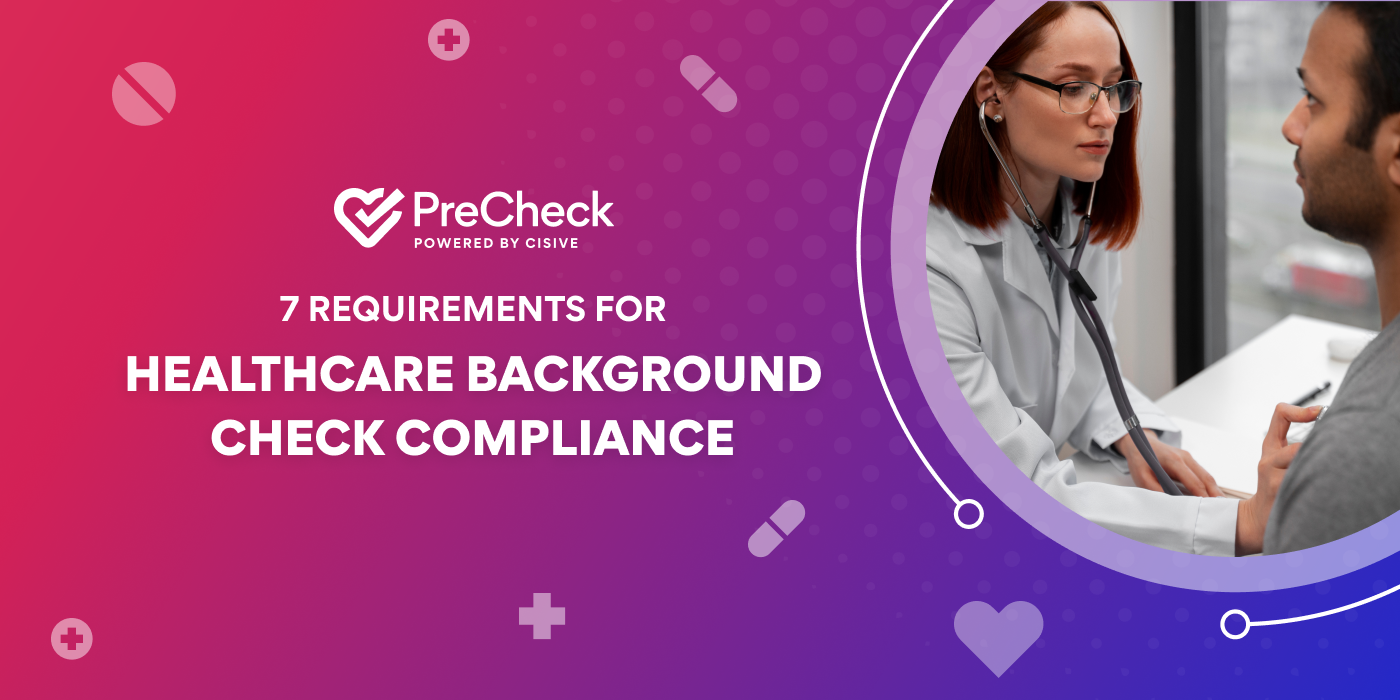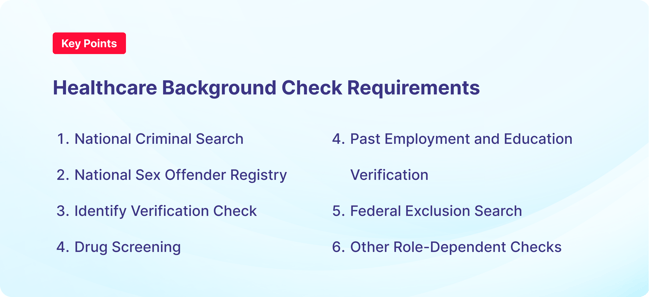

Healthcare employers have unique needs when it comes to vetting potential employees. Whether you're...

Filling healthcare roles with qualified, compassionate professionals can present a challenge in the current climate. However, you can't ease up on your screening processes in a bid to fill your vacancies quickly.
Adequate, compliant background checks narrow down your applicant pool to the people who can provide high-quality, safe patient care. They look for potential red flags related to an applicant's criminal history, substance abuse, licensure, immunizations, and previous infractions.
Following healthcare background check compliance protocols can improve the quality of your hires. That, in turn, can increase patient satisfaction by providing them with compassionate, quality care.
Conducting compliant background checks also protects your healthcare organization from negative consequences. Failure to remain compliant could result in issues such as fines and exclusions from federal healthcare programs.
Learn what it takes to meet compliance standards related to healthcare background checks.
Hiring for healthcare positions requires special attention to the regulations and requirements for employees. Proper background checks are important for the safety of patients, but healthcare background check compliance is also essential for operating your business within applicable regulations.
Safeguards are in place when hiring for healthcare positions to ensure proper patient care. That often starts with the employee screening process when hiring for open positions.
Understanding the relevant regulations for healthcare workers empowers you to create a thorough hiring process that checks all the boxes while creating the safest possible environment for your patients.
Key Takeaways
|
All members of a healthcare facility's team have access to patients and private medical data, even if they don't work with them directly. Your patients and their families expect you to provide safe care.
Building compliance into your healthcare background check process helps you meet those expectations. It's an essential way for you to screen candidates to avoid hiring anyone who might create an unsafe environment.
Comprehensive healthcare background checks look at criminal records, education, employment, credentials, and past violations that could impact your organization. You need to run multiple checks covering these various components to get a full picture of the candidate and maintain compliance.
Some of the reasons background check compliance is important include:
You're responsible for hiring employees who meet the minimum requirements for various healthcare roles. Compliant background checks look for those necessary credentials to help you avoid hiring someone who isn't qualified.
Looking for instances of abuse or criminal history can keep your patients away from employees who could harm them in some way.
If you don't verify all background information, you could make a negligent hire, which puts your organization at risk.
By hiring highly qualified, competent, reliable medical professionals, you could reduce your risk of medical malpractice cases in the future. A team member who is unqualified might act negligently and put your organization at risk of legal action for the medical mistakes they make.
Certain offenses exclude healthcare workers from receiving federal funding or participating in federal programs. Finding that out before you hire them protects your organization's eligibility and financial standing.
The people you hire represent your organization and influence its reputation. If you hire unqualified people or individuals who commit crimes while working for you, it tarnishes your organization's reputation. That might cause patients to seek alternative care options.
Failing to meet background check compliance standards could help you avoid fines and other actions against your organization. It could also prevent you from hiring someone who eventually does something that comes with a fine.
Having a policy of ongoing monitoring and background checks can help you keep an eye on employees' behavior after they're hired. You can find out about new violations early so you can manage the situation and mitigate consequences for your facility.
Recommended Reading: How You Can Solve the Nursing Shortage

To remain compliant, you need to perform several specific types of background checks.
Specific requirements for a healthcare background check report can vary based on the organization that's performing them. Variations might exist based on the role and the location of your organization, and the applicable federal, state, and local laws.
It's important to understand which background checks are required for your organization and the roles you're hiring for.
Here are some of the common healthcare background check requirements.
This element of healthcare background checks looks for criminal convictions on prospective employees. It looks nationwide using several databases from various jurisdictions.
Running this type of search helps you identify past criminal actions that could create an unsafe environment for your patients. For example, someone with a criminal record of abuse could potentially harm your patients.
Finding a criminal history doesn't automatically exclude a candidate from receiving a job with your facility. It simply gives you the information you need to make an informed decision.
Check on "ban the box" legislation in your area. These local and state laws might restrict how you can use criminal background checks to make hiring decisions.
They typically aim to remove checkboxes on applications that ask about criminal offenses. Some laws also restrict when you can conduct background checks until later in the hiring process.
Because healthcare workers come into contact with vulnerable patients, it's important to check for past sex crimes. Checking on this issue could protect patients from sexual abuse by staff members.
This search looks for charges and convictions of sex crimes. It also shows people who have pleaded guilty to sex crimes.
It's possible for some applicants to misrepresent who they are. Hiring someone based on that false identity could result in someone who's unqualified or someone with ill intent having access to patients.
By running identity verification checks, you can make sure you have the correct identity for the applicant. This, in turn, ensures the additional background checks you run are on the correct person.
Identity verification is an important part of responsible hiring to make sure you know who is working for your organization.
Healthcare workers often make decisions for patient care. People with substance abuse problems might not have sound judgment, which could harm the patient or fail to give them the best possible care.
Substance abuse might also cause healthcare workers to illegally access the drugs that are available in the healthcare facility. These situations put your organization at risk for devastating situations and potential legal action.
Every healthcare position has different educational and certification requirements. You might require a certain amount of experience in a field for a vacancy.
Running this type of check ensures the applicant meets those experience and education requirements. Verifying past employment also alerts you to employees who were terminated from previous positions, potentially due to serious mistakes.
Healthcare organizations often rely on federally funded programs, such as Medicare. Some healthcare workers can't receive federal funds due to their criminal record.
By running a federal exclusion search, you can determine if the candidate would prevent you from participating in those federal programs. You might choose a different candidate to protect your federal funding based on this search.
You may need to run additional checks to remain compliant. Healthcare positions typically require a check for healthcare sanctions due to issues such as abuse or fraud.
Those offenses can result in exclusions for the healthcare worker. Running this check at the state and federal levels helps you avoid hiring someone with those issues.
You might also track immunizations to make sure employees don't spread communicable diseases to patients. Immunizations might be required for certain roles, so you can verify that applicants have those vaccinations now and continue to receive them as required.
These various background checks should happen before hiring a candidate to prevent potential consequences for your organization. Continuous monitoring of current employees lets you know if they have a future offense that might affect their employment in healthcare.
Recommended Reading: The Role of Credentialing in Healthcare Reputation Management
You can conduct your own compliant healthcare background checks, but you might find that it's easier to partner with a background check provider. Running background checks yourself is often an involved, time-consuming process.
Internally conducted background checks take much longer because your staff is doing all the work. You need to send multiple information requests to access all of the required information.
Doing the work yourself creates a complex logical situation to keep all the documentation organized and to verify that you complete all the necessary checks. It can create some inconsistencies if you have different people running the checks or don't have a solid, established process.
You also run the risk of missing key issues related to background check compliance. Regulations change periodically, or you might simply miss some specifics required to meet the regulations.
Additionally, using inaccurate or unreliable sources could decrease the quality of your background check results. This leaves you open to risks, such as missing disqualifying offenses or failing to validate identities and credentials.
Recommended Reading: Your Guide to Hiring International Nurses
Ensuring you follow background check compliance guidelines, including local, state, and federal laws, helps you hire highly qualified team members who are trustworthy and provide safe care for your patients. Understanding those compliance issues and ensuring your processes meet them can protect your organization and your patients.
Conducting proper background checks on your employees is essential for keeping your healthcare facilities in compliance. Partnering with a consumer reporting agency like PreCheck, who is fully compliant with the Fair Credit Reporting Act (FCRA) and accredited by the Professional Background Screening Association (PBSA), can help you ensure you're following compliance laws when ordering background check reports to make employment decisions. Get an individualized assessment and find out how you can streamline hiring for your healthcare positions by speaking with a PreCheck expert.
Author: Cisive Staff
Bio: Contributed by a member of our staff with expertise in background screening for highly regulated industries.
Let's Connect on LinkedIn
Healthcare employers have unique needs when it comes to vetting potential employees. Whether you're...

Hiring in healthcare carries a higher standard of responsibility than almost any other field. When...

Healthcare background check compliance is a critical component of the hiring process. Who you hire...